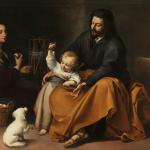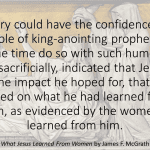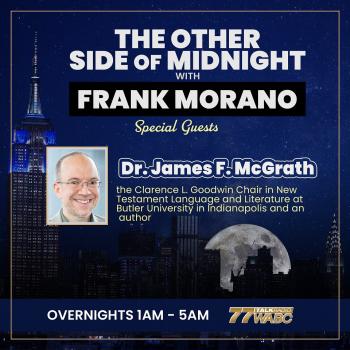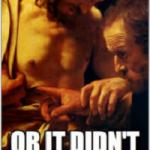We finally wrapped up our study of the Gospel of John in my Sunday school class a while back. It seems like ages ago. This was when we were still meeting face to face, if that gives you any indication. There were a lot of really helpful things that came up in discussion as we neared the end, including many that I hadn’t thought of adequately or hadn’t approached in quite the way the class discussion led me to. And so once again I find myself grateful to this class for the ways it helps me think and leads me to a better and deeper understanding of the scriptures.
One thing that we talked about was the oddity of Peter getting dressed and then jumping into the water. I’m not sure why, but it hadn’t really dawned on me that Peter did the opposite of what would seem most natural. One could perhaps come up with some symbolic interpretations, whether indicating that this is not an act with baptismal overtones even on the symbolic level, or connecting it with being “clothed with Christ.” But I prefer the reason for this detail that someone in my class offered, based on notes in their Bible if I’m not mistaken: Peter was “an exuberant goober.” In other words, as we’ve seen on other occasions, he had a penchant for letting his enthusiasm prompt him to speech and/or action before he’d really reflected or thought about what he should say and/or do.
Hearing that description of Peter, I knew almost immediately I was going to write a blog post with that title.
Another thing that hadn’t quite clicked for me until recently is the fact that Peter doesn’t answer Jesus’ three questions. Jesus doesn’t ask Peter whether he loves him. He asks Peter whether he loves him more than the others do. Peter, in simply saying “you know I love you,” is avoiding the question.
There were other things that struck me. One is the imagery that the fisherman will shepherd, and ultimately give his life like the good shepherd depicted earlier in the Gospel.
If I am correct that John 21 reflects the kind of story that was once to be found at the end of the Gospel of Mark, there is a natural bookending of Peter’s story. He ends where he began, along the shore with a miraculous catch of fish, encountering Jesus. The first time was a beginning (even if they had known each other previously, say in the entourage around John the Baptist). This time it was for a new beginning.
We also discussed the topic of authors and editors, noting the double ending, the reference to an author by someone who is clearly not the author, and other such details.
On this topic see also Lionel Windsor on preaching shepherding, and Robert Myles on why he is persuaded that the author of this Gospel could not have been a Galilean fisherman. He may be right, but I’m not certain that considerations about social class and education can guide us accurately with respect to who may have been the source of or authored a work. Being able to write and read were not the same thing as being able to compose words in a manner that was eloquent in the popular sense, if not necessarily rhetorically polished in a manner that few ancient people were trained in. That said, internal evidence would suggest Lazarus (singled out as the one Jesus loves) as the source behind the Gospel, and a consideration of later tradition suggests that it was someone named John who was not the son of Zebedee who wrote the work. The conflating of him with John the son of Zebedee, one of the Twelve, comes later.













